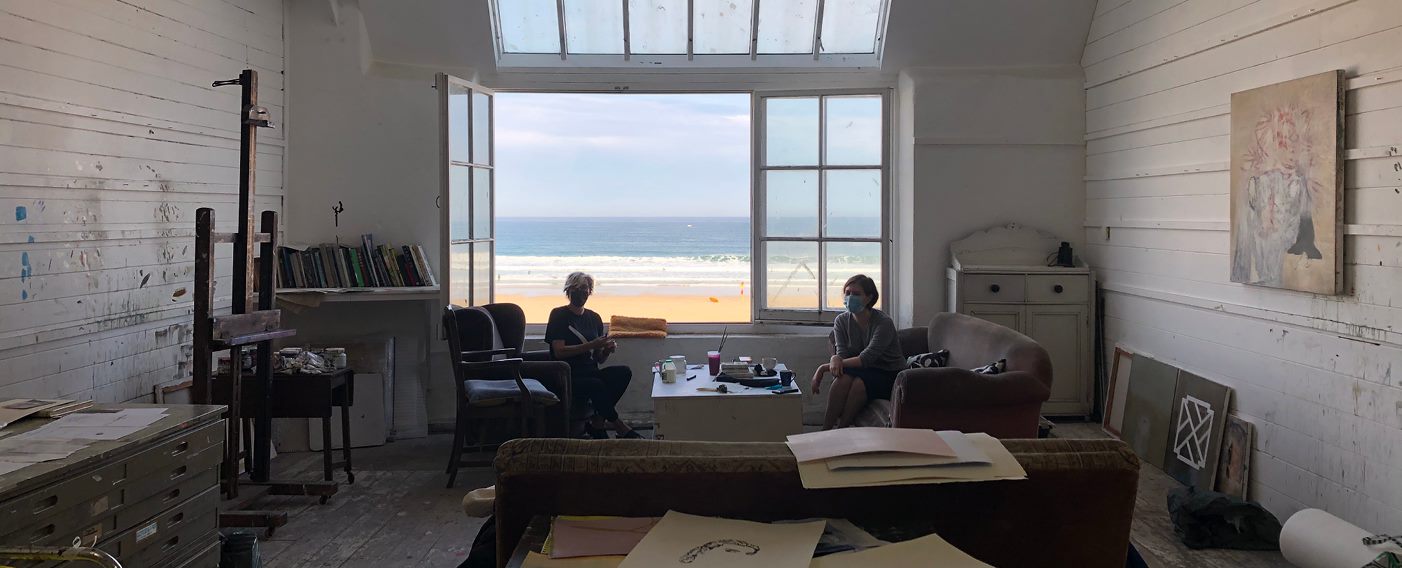Digital Art School: Naomi Frears
Give this monoprinting tutorial a go with visual artist and filmmaker Naomi.

THE WORKSHOP
Monoprinting using plastic, paint and paper
In this workshop artist Naomi Frears will show you how to create a monoprint without the use of a printing press. Reusing images from old magazines is perfect for this, but you can also use postcards you might have at home and no longer need.
You will need:
- A4 paper
- A shiny hard surface that can be wiped clean. This could be a piece of perspex, plastic, old mirror or glass.
- One or two old magazines
- Two or three ink rollers (like these )
- Water-soluble printing inks in two or three colours: black, white and a colour of your choice (an example can be found here)
- Scissors (you can also tear paper)
- Rags and soapy water or biodegradable baby wipes
- Biodegradable bamboo cotton buds (optional)
Fancy joining in with others for this workshop? You can #createalong with Naomi on the 5th of November– sign up.

THE ARTIST
Naomi is known for her bold, ambiguous and subtly haunting paintings. Born in rural Leicestershire and having studied at Loughborough and Sunderland Colleges of Art, she has lived and worked in Cornwall for many years. Based out of the Porthmeor Studios, her space is one of the most famous, occupied once upon a time by Francis Bacon, who described it as ‘the best room in St Ives’.
Spanning oil, acrylic, dry point and printmaking, Naomi’s artworks use a painstaking process of layering and editing which can take years to complete. Personal and intimate, shadows or ghosts of previous ideas, figures and structures are often visible within her paintings, which she has been known to describe as ‘love letters’.
As well as a plethora of solo exhibitions within the South West, Frears is passionate about giving back to the Cornish community. She has been heavily involved in local gallery education, leading workshops, devising courses and giving talks at Tate St Ives since its opening, as well as Falmouth Gallery, Newlyn Art Gallery & The Exchange, Penzance School of Art and St Ives School of Painting. She has also been a visiting lecturer at Falmouth University.
Can you tell us a bit about your artistic practice?
My practice includes printmaking, painting, and making films as well as curatorial projects.
How does Cornwall impact, influence or find its way into your work?
Cornwall is very important to my work – probably not so much in terms of subject matter – but because it’s where my community is and this is what makes it the best place for me to make work.

This season our designers were inspired by the Cornish Modernists – has the work of these pioneers of the twentieth century laid any foundations for you, or does your work take any lead from these artists?
I love the Modernists and I don’t think any of us artists are immune to their charms. They were based here, pushing boundaries and looking out at the whole world and I hope we are still doing that.
Can you tell us a little about your connection to Seasalt?
I remember you starting from a shop near the station in Penzance. You’ve grown, are so successful but keep an identity very much linked to the far west. You did a photoshoot in my Porthmeor studio a few years ago which was great.
Why did you decide to get involved with Hospital Rooms and Digital Art School?
Hospital Rooms are a fantastic organisation who make a bridge between contemporary art and mental health – such a great thing. Of course I wanted to work with them.
Which part of the project are you most excited about?
I am really looking forward to visiting [Bethlem Mother & Baby Unit where] I will be working in and meeting the women there and the staff. This meeting will inform what kind of work I make there.

What positive connections do you see between art and mental health?
Art and mental health are very connected. Both concern what it means to be really human and open, vulnerable and imperfect. There’s a lot of pretence in the world and art and mental health let us try to find truths I think.
Tell us about your online workshop and what people can expect…
I hope my online workshop will help people, with quite simple materials, to play with images and have fun while maybe learning a new technique.
How do you feel about hosting a workshop online?
I am definitely nervous about hosting an online workshop but excited to see what happens.

How have you found these Covid times?
This spring and summer – Covid time – has been mixed. Some lovely quiet time to think as shows were postponed and at other times a lot of uncertainty and concern for people closer to the heart of the pandemic.
Who should get involved with Digital Art School?
I hope anybody who is interested in art or making images will get something from being involved with Digital Art School.

